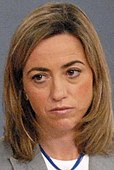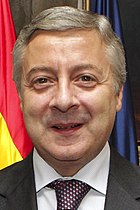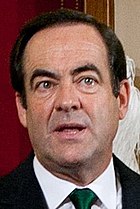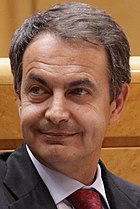
The Spanish Socialist Workers' Party is a social-democratic political party in Spain. The PSOE has been in government longer than any other political party in modern democratic Spain: from 1982 to 1996 under Felipe González, 2004 to 2011 under José Luis Rodríguez Zapatero, and since 2018 under Pedro Sánchez.

The 1989 Spanish general election was held on Sunday, 29 October 1989, to elect the 4th Cortes Generales of the Kingdom of Spain. All 350 seats in the Congress of Deputies were up for election, as well as 208 of 254 seats in the Senate. An election had not been due until 28 July 1990 at latest, but Prime Minister Felipe González called for a snap election nine months ahead of schedule, allegedly on the need of implementing tough economic measures. González hoped to capitalize on a still strong economy and his party's electoral success in a European Parliament election held in June, after a troubled legislature which had seen an increase of social protest on his government's economic policy and the calling of a massive general strike in 1988.
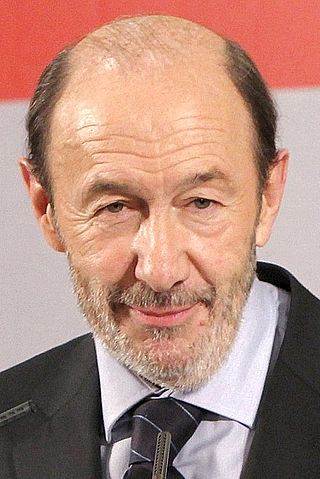
Alfredo Pérez Rubalcaba was a Spanish statesman, politician and chemist who served as Deputy Prime Minister of Spain from 2010 to 2011, and previously as Minister of Education from 1992 to 1993, as Minister of the Presidency from 1993 to 1996, as Minister of the Interior from 2006 to 2011 and as acting Minister of Defence between May and June 2008.

The 2000 Spanish general election was held on Sunday, 12 March 2000, to elect the 7th Cortes Generales of the Kingdom of Spain. All 350 seats in the Congress of Deputies were up for election, as well as 208 of 259 seats in the Senate.

The Leader of the Opposition is an unofficial, mostly conventional and honorary title frequently held by the leader of the largest party in the Congress of Deputies—the lower house of the Spanish parliament, the Cortes Generales—not within the government. They are usually the person who is expected to lead that party into the next general election.
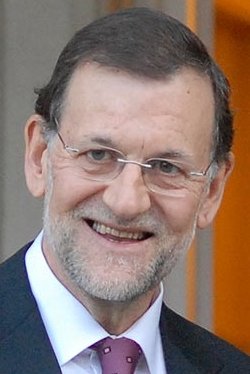
The 2011 Spanish general election was held on Sunday, 20 November 2011, to elect the 10th Cortes Generales of the Kingdom of Spain. All 350 seats in the Congress of Deputies were up for election, as well as 208 of 266 seats in the Senate. An election had not been due until April 2012 at latest, but a call by Prime Minister José Luis Rodríguez Zapatero for a snap election five months ahead of schedule was announced on 29 July 2011. Zapatero would not be seeking a third term in office, and with political pressure mounting, a deteriorating economic situation and his political project exhausted, an early election was perceived as the only way out.

José María Barreda Fontes is a Spanish politician and historian. A member of the Spanish Socialist Workers' Party (PSOE), he served as President of the Junta of Communities of Castilla–La Mancha from 2004 until 2011. As of 2019, he works as senior lecturer of Contemporary History at the University of Castilla–La Mancha.
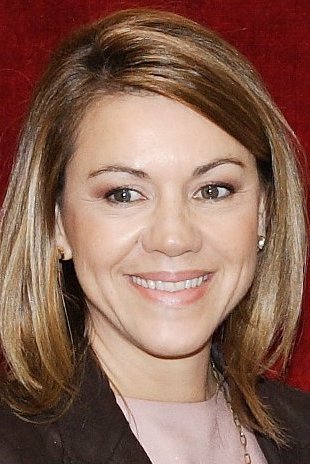
The 2011 Castilian-Manchegan regional election was held on Sunday, 22 May 2011, to elect the 8th Cortes of the autonomous community of Castilla–La Mancha. All 49 seats in the Cortes were up for election. The election was held simultaneously with regional elections in twelve other autonomous communities and local elections all throughout Spain.

The 35th Federal Congress of the Spanish Socialist Workers' Party was held in Madrid from 21 to 23 July 2000 to renovate the governing bodies of the Spanish Socialist Workers' Party (PSOE) and establish the party's main lines of action and strategy for the next leadership term. It was held after the party's defeat in the 2000 general election and the subsequent resignation of then secretary-general Joaquín Almunia.

The 2014 Extraordinary Federal Congress of the Spanish Socialist Workers' Party was held in Madrid from 26 to 27 July 2014, to renovate the governing bodies of the Spanish Socialist Workers' Party (PSOE) and establish the party's main lines of action and strategy for the next leadership term. A primary election to elect the new party secretary-general was held on 13 July. The congress was called by outgoing PSOE leader Alfredo Pérez Rubalcaba after his party's poor results at the 2014 European Parliament election, garnering just 23% of the vote. Rubalcaba announced his intention not to run for either his party's leadership or for the 2015 Spanish general election.
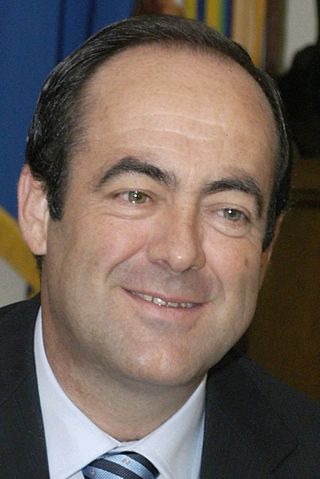
The 2003 Castilian-Manchegan regional election was held on Sunday, 25 May 2003, to elect the 6th Cortes of the autonomous community of Castilla–La Mancha. All 47 seats in the Cortes were up for election. The election was held simultaneously with regional elections in twelve other autonomous communities and local elections all throughout Spain.

The 1983 Castilian-Leonese regional election was held on Sunday, 8 May 1983, to elect the 1st Cortes of the autonomous community of Castile and León. All 84 seats in the Cortes were up for election. The election was held simultaneously with regional elections in twelve other autonomous communities and local elections all throughout Spain.

The 39th Federal Congress of the Spanish Socialist Workers' Party was held in Madrid between 16 and 18 June 2017, to elect a new party leadership in the Spanish Socialist Workers' Party (PSOE) and set out the party's main lines of action and strategy, after the sacking of Pedro Sánchez as party leader in October 2016 had resulted in a caretaker leadership being appointed. The primary election was held on 21 May 2017, after being confirmed in a federal committee on 1 April.

The 18th National Congress of the People's Party was held in Madrid from 10 to 12 February 2017, to renovate the governing bodies of the People's Party (PP) and establish the party's main lines of action and strategy for the next leadership term. The congress was initially due for 2015, but the various elections held in Spain that year and the deadlock in the government formation negotiations leading up to the 2016 general election, as well as a major crisis over the issue within the opposition Spanish Socialist Workers' Party (PSOE), saw the event being delayed until early 2017.
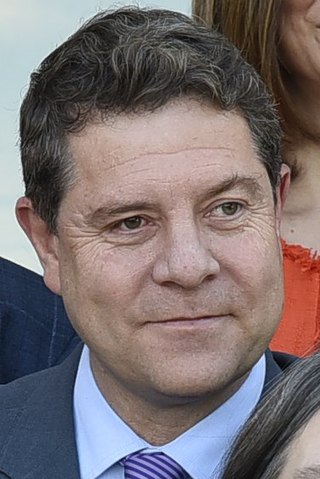
The 2019 Castilian-Manchegan regional election was held on Sunday, 26 May 2019, to elect the 10th Cortes of the autonomous community of Castilla–La Mancha. All 33 seats in the Cortes were up for election. The election was held simultaneously with regional elections in eleven other autonomous communities and local elections all throughout Spain, as well as the 2019 European Parliament election.

The 17th National Congress of the People's Party was held in Seville from 17 to 19 February 2012, to renovate the governing bodies of the People's Party (PP) and establish the party's main lines of action and strategy for the next leadership term. The congress slogan was "Committed to Spain", and it saw Mariano Rajoy, incumbent prime minister of Spain as a result of the PP victory at the 2011 Spanish general election, being re-elected unopposed for a third term as party president with 97.6% of the delegate vote in the congress and 2.4% of blank ballots (63).

Blanca Pilar Fernández Morena is a Spanish politician member of the Spanish Socialist Workers' Party (PSOE), regional minister of Equality and a Spokesperson of the Government of Castilla–La Mancha since July 2019. She was a member of the 8th and 9th Cortes of Castilla–La Mancha as well as the 13th Congress of Deputies.
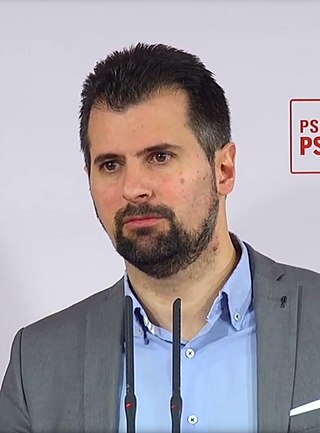
Luis Tudanca Fernández is a Spanish Socialist Workers' Party (PSOE) politician who has been the party's Secretary General in Castile and León since 2014. He has been Leader of the Opposition in the Cortes of Castile and León since the 2015 elections, and was previously in the Congress of Deputies between 2008 and 2015.
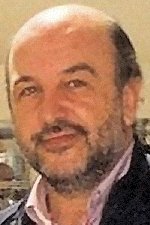
The 34th Federal Congress of the Spanish Socialist Workers' Party was held in Madrid from 20 to 22 June 1997, to renovate the governing bodies of the Spanish Socialist Workers' Party (PSOE) and establish the party's main lines of action and strategy for the next leadership term. It saw Joaquín Almunia being elected unopposed as party secretary-general, with 74.7% of the delegate vote in the congress and 25.3% of blank ballots (231), following Felipe González's surprise announce in the congress opening that he would not be seeking re-election as party leader.

The 41st Federal Congress of the Spanish Socialist Workers' Party will be held in Seville from 29 November to 1 December 2024, to renovate the governing bodies of the Spanish Socialist Workers' Party (PSOE) and establish the party's main lines of action and strategy for the next leadership term. Although the congress was scheduled to be held in 2025, party leader Pedro Sánchez had expressed his intention to advance it to late 2024, with this being confirmed on 30 August 2024. Initially planned for 15–17 November, it was delayed two weeks for "logistical reasons".


